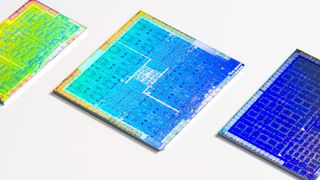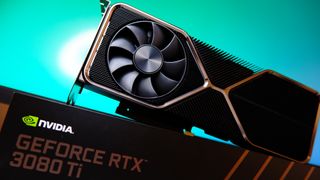The unthinkable has happened: Nvidia has finally embraced open-source GPU drivers
It may only be the GPU kernel modules opening up right now, but it's definitely a start.

No, hell hasn't frozen over, and April Fools Day has long since passed. Nvidia has indeed announced it's moving over to an open-source Linux GPU kernel for its latest and greatest graphics cards. Previously open-source GPU anything was the sole preserve of AMD, but as of right now you can go to GitHub and download the source code for Nvidia's kernel modules on the Nvidia Open GPU Kernel Modules repo.
The green team is calling this "a significant step toward improving the experience of using NVIDIA GPUs in Linux, for tighter integration with the OS and for developers to debug, integrate, and contribute back." And, as someone who has bounced off various Linux distros hard in the past, I'm going to join in with the chorus of folk saying that it's about time.
Mainly I struggled in the past because I couldn't get my modern Nvidia graphics cards playing nice with such exotic things as a desktop environment or a multi-monitor setup. Let alone actually playing games. With this recent change, however, it means developers and distro providers will be more able to tightly integrate driver support into their software.
Previously it was a bit of a crapshoot.
You had to go with Nvidia's proprietary drivers, which had a one-size-fits-all approach to distro support, where it most certainly did not. Y'know, fit all.
So, is this the Nvidia panacea to gaming on Linux? I spoke with Jonni Bidwell, technical editor of premier Linux publication, Linux Format, about why this has happened and what this announcement will actually mean for the end user.
"It's a good start certainly," he tells me. "They have a huge range of hardware (much of the older stuff is now only supported via the reverse-engineered Nouveau driver) and they've chosen to open-source bits for new models. I'd say they've done this because lots of machine learning stuff is already geared towards Nvidia and CUDA. (Leela chess zero, the open-source chess neural network, for example, doesn't work awesomely with AMD and OpenCL).
PC Gamer Newsletter
Sign up to get the best content of the week, and great gaming deals, as picked by the editors.
"Having an entirely open stack is easier to debug and develop for. And hopefully no more not having graphics after a kernel update because something broke."

Will this mean with better Nvidia driver support we get higher performance in games? Sadly, probably not, at least not straight away.
"They say the drivers are 'alpha quality' for end users at the mo," says Bidwell. "But the move will surely help gaming to some extent, though I doubt 'open' will immediately translate into 'moar fps'. Again it just means game devs don't have to hack around drivers so much, and it will be easier for wannabe driver developers to do the converse.
"The modules haven't been accepted into the kernel yet, and there likely will be some back and forth with that. Once they're in, it'll take a wee while before they're picked up by mainstream distributions."

Steam Deck review: Our verdict on Valve's handheld PC.
Steam Deck availability: How to get one.
Steam Deck battery life: What's the real battery life of the new device?
How loud is the Steam Deck? And will it pass the Significant Other test?
Steam Deck - The emulation dream machine: Using Valve's handheld hardware as the ultimate emulator.
Aside from the increased importance of machine learning, and the fact that Linux is prevalent in the data center and supercomputer environments, Nvidia going open is also going to be at least partly down to the competition.
"Nvidia has always been a black sheep for Linux," says Bidwell, "as by this stage theirs is really the only proprietary driver that regular users have to deal with. And generally, they don't enjoy it. So it's as much about gaining parity with AMD's open driver strategy. Which was likewise glorious news when it was announced."
This is indeed a significant moment in the cause of Linux, and for gaming on Linux. This year may not exactly be the 'Year of Linux Gaming' as a genuine alternative to Windows, but with Nvidia opening up, the success of the Steam Deck, and the potential of Valve's SteamOS 3.0 and its Proton tech, things are certainly looking more possible in that regard.

Dave has been gaming since the days of Zaxxon and Lady Bug on the Colecovision, and code books for the Commodore Vic 20 (Death Race 2000!). He built his first gaming PC at the tender age of 16, and finally finished bug-fixing the Cyrix-based system around a year later. When he dropped it out of the window. He first started writing for Official PlayStation Magazine and Xbox World many decades ago, then moved onto PC Format full-time, then PC Gamer, TechRadar, and T3 among others. Now he's back, writing about the nightmarish graphics card market, CPUs with more cores than sense, gaming laptops hotter than the sun, and SSDs more capacious than a Cybertruck.
Most Popular







